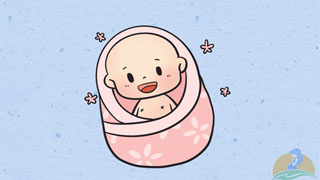
Article excerpt: "Traditional Chinese Medicine Ancient Methods for Infant and Child Health Preservation"
Cold is a common disease in pediatrics. Generally speaking, the symptoms of a cold include fever, sneezing, runny nose, and coughing. Further development can lead to sore throat, symptoms such as phlegm or fear of cold, which are very common for children.
Especially during the winter and spring seasons, it's easy to do this. As mentioned earlier, children's organs are delicate, so during seasonal changes, they are particularly susceptible to external attacks such as wind, cold, heat, dampness, dryness, and fire, which can lead to illness.
Why do children love to catch colds?
A mother asked:
My baby doesn't get sick much, but he caught a cold twice during the season change. He has a bit of a fever, a cough, and a runny nose.
Dr. Peng Xin replied:
Children's skin, called skin pores in traditional Chinese medicine, is relatively weak and not as dense as adults, making it easily susceptible to external attacks from wind and cold. For example, the hot cold mentioned by the mother in the above case is not mainly characterized by symptoms such as fear of cold, fever, and nasal congestion, but by fever, some pain in the throat, and yellow nasal discharge. This is called a hot cold, which is common in summer and is commonly referred to as a cold by the public. In traditional Chinese medicine, colds are classified into wind cold, wind heat, heat and dampness, etc.
The most important thing about a cold is not heat and cold, but wind and wind evil. So the common people call it a cold. A cold is the external energy of the body, which is the lack of stability in the external energy of the fur and fur. As soon as the wind comes in, whatever the wind brings in, the body will get sick.
This wind is a type of evil energy, not necessarily the kind that blows. One characteristic of wind is its ability to change shape and number, which changes rapidly. Therefore, when you see a child suffering from a cold or flu, their overall symptoms change rapidly, which is the first characteristic. The second characteristic is that it is easy to damage the exterior, which is the surface. It cannot damage the internal organs, only some surface symptoms such as runny nose and sneezing, which all damage the epidermis.
Wind is a code name in traditional Chinese medicine, representing flowing, constantly changing, and unstable qi. Traditional Chinese medicine usually names these qi as wind cold, summer heat, dampness, dryness, and fire. There are six types of qi, also known as the six lewd, and wind is the most powerful. Wind is the root of all diseases. Wind easily brings cold, heat, dampness, dryness, and fire into the body. Like scissors, wind breaks through the first layer of defense and leads a large group of people into this castle, causing many diseases.
From the perspective of traditional Chinese medicine, it is due to poor opening and closing of the skin, fur, and pores. When these cold or hot gases enter, it is easy to cause this problem. Especially for ordinary children, why are they prone to catching a cold during seasonal changes? There are two issues with changing seasons. Firstly, there is a large temperature difference between indoors and outdoors; Secondly, when a child is in a relatively enclosed air state, they will experience less disturbance, but when they go to a windy place, the disturbance to their body will be greater when blown, which can be harmful to their body.
Colds are usually caused by external winds, according to the theory of traditional Chinese medicine. According to the theory of Western medicine, 70% to 80% of colds are caused by viruses, with viral colds being more common. In addition to viruses, pathogenic microorganisms include bacteria such as streptococcus, pneumococcus, and influenza virus.
But from the perspective of traditional Chinese medicine, we have to ask a question: bacteria are everywhere. There are bacteria and viruses everywhere in the air. Why should this child get sick while other children cannot? The problem is that each child's physical condition is different. With internal factors, coupled with external factors, it is easy to get sick.
Some children may appear to have good resistance on the surface and not get sick very often, but once they get sick, they may become more severe. In fact, their inner balance is still not very balanced. So from the perspective of traditional Chinese medicine, as long as the internal organs are balanced, the vitality is sufficient, and the ability to drive away evil is strong, it is not easy to get sick in this situation, which is a manifestation of strong physical constitution.
What kind of children love to catch a cold?
Children who are prone to catching a cold have two manifestations:
Firstly, the internal heat is particularly heavy. These children like to eat spicy and high calorie foods, which can easily lead to the retention of dampness and heat in the intestines and stomach. Once exposed to wind and cold, it can easily cause symptoms such as fever, rhinitis, runny nose, and even tonsillitis;
Secondly, the innate vitality is not sufficient. These children have grayish yellow faces, poor digestive system, do not like to eat, and their stool is either very thin or very dry. This is a manifestation of poor internal qi circulation and unhealthy temperament. Both types of children require medication for conditioning or dietary therapy.
Some mothers often ask me, "Some people say that children often catch colds, which is a way to exercise their immunity. They also say that once they catch a cold, their body becomes strong once, and once they have a fever, they grow taller once. Does this make sense
This issue needs to be viewed dialectically. If it is a slight fever, it is a bit like the "theory of changing steam". The theory of changing steam is that once it is burned, the entire internal organs will mature, grow wisdom, and strengthen the body, as the ancients said.
From another perspective of traditional Chinese medicine, fever itself is a manifestation of resistance to evil, which can eliminate some toxins. Because a fever can cause sweating, drinking too much water, and urinating, all toxins in the body can be eliminated. However, if fever occurs frequently, it is not good for the body. Similarly, frequent colds can also have an impact on physical development.
Disclaimer: This article is a sharing of health knowledge. The drugs, prescriptions, acupuncture and moxibustion and other treatment and health preserving methods mentioned in this article should be applied under the guidance of professional doctors, and should not be applied by yourself. We are not responsible for any issues arising from improper use.


